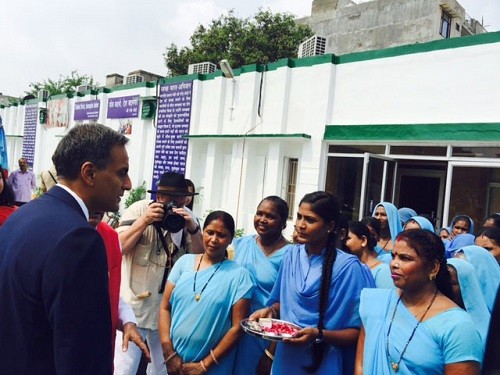
For Immediate Release
New Delhi | August 13, 2015
The U.S. Ambassador to India Richard Verma today visited the headquarters of Sulabh International to witness the award-winning organization’s innovative sanitation and behavior change work. At Sulabh’s West Delhi complex, Verma also met with Dalit women who were formerly manual scavengers.
Set up by eminent sociologist and social activist Dr. Bindeshwar Pathak, Sulabh is a partner in USAID’s (United States Agency for International Development) Social and Behavior Change Coalition formed to promote the adoption of improved hygiene practices across the country. Sulabh has constructed nearly 1.3 million household toilets and 54 million government toilets based on an innovative toilet design. Nearly 15 million people use these toilets daily. Apart from the construction of toilets, the organization is also leading a movement to discourage manual scavenging.
“I have been moved by the way Dr. Pathak and Sulabh International is changing the lives of millions of Indians. It’s highly commendable that his work is not only stopping open defecation in India but is also restoring the dignity of the marginalized and mainstreaming them in society,” Ambassador Verma said. “The U.S. Government shares Dr. Pathak’s belief that providing toilets can be a tool for social change and that innovation is integral to improving the lives of those on the margins of society.”
In partnership with the India’s Ministry of Urban Development and the Bill and Melinda Gates Foundation, USAID is working to replicate innovative water and sanitation models across the country to support Prime Minister Narendra Modi’s Swachh Bharat mission and other urban development initiatives. In addition, USAID’s Urban WASH Alliance is supporting five public-private partnerships that are improving water and sanitation services in seven cities and catalyzing behavior change such as hand washing, reducing open defecation, and providing appropriate treatment for children with diarrhea. Early successes of these partnerships include plans to:
- Construct 4,000 toilets and provide safe drinking water to 10,000 urban settlements in Delhi in partnership with the Center for Urban and Regional Excellence (CURE).
- Reach 20 municipal schools and 2,500 students in Kolkata and Chennai through collaboration with Coca-Cola and TERI University.
- With WaterHealth India, provide over 32,000 households in Bangalore with world-class safe drinking water at one-eighth the cost via state-of-the-art water filtration machines.
- A WASH Social and Behavior Change Coalition formed to bring together 10 private sector and civil society partners including Sulabh to share best communications and advocacy practices to promote use of toilets and improved hygiene behaviors across the country.







Comment
Make a general inquiry or suggest an improvement.